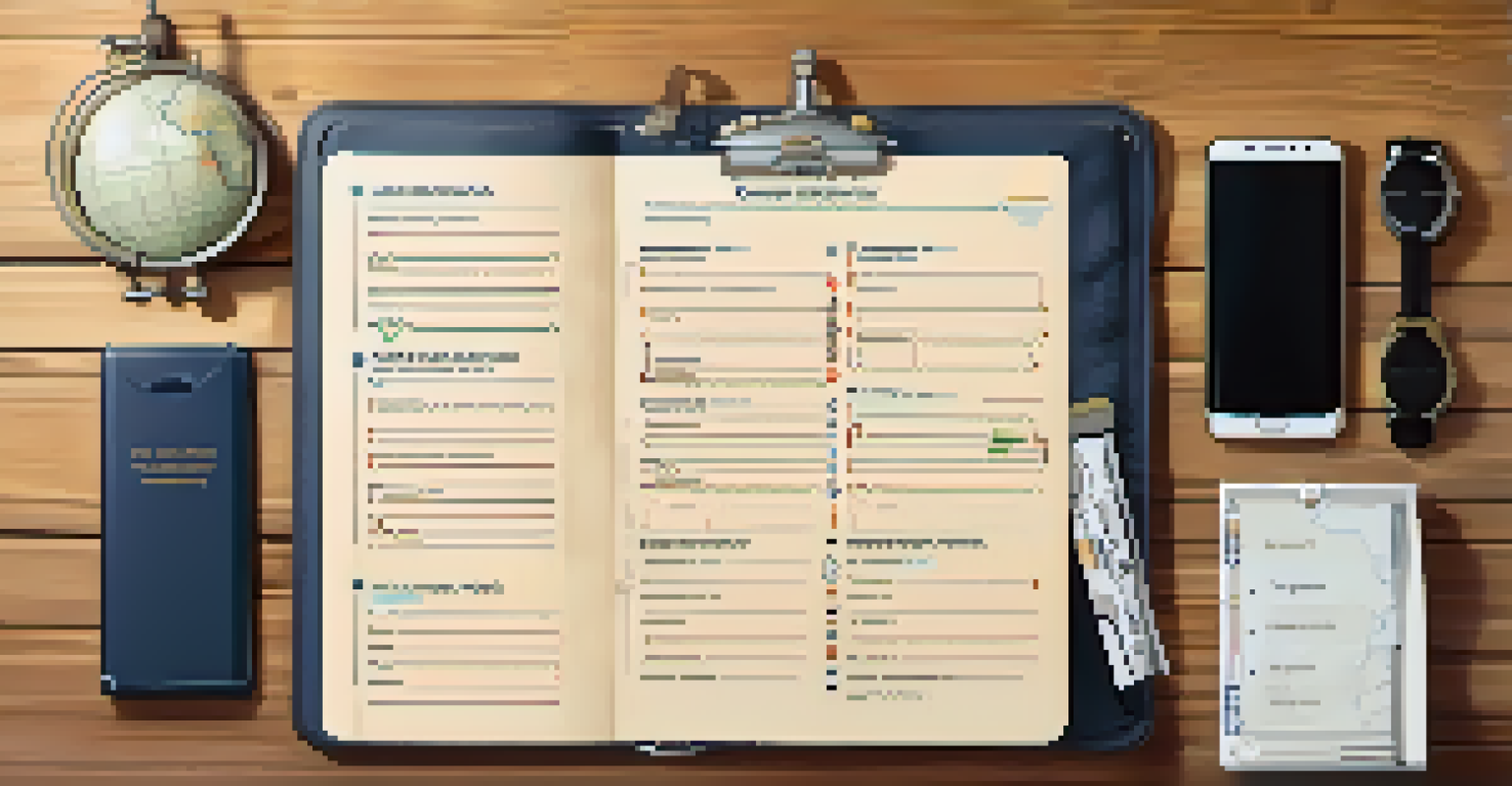Mental Health Strategies for Traveling During Crises

Understanding the Impact of Crises on Mental Health
Traveling during a crisis can significantly affect your mental well-being. Whether it's a pandemic, political unrest, or natural disasters, the stress of the situation can lead to anxiety and uncertainty. Understanding this impact is crucial as it sets the foundation for how to cope when you’re on the move.
Traveling can be a wonderful experience, but it can also be a source of stress and anxiety. It's important to prioritize your mental health while on the move.
For instance, many travelers have reported feelings of helplessness or fear when faced with unexpected challenges. Recognizing these emotions as valid responses can help you address them more effectively. It's normal to feel overwhelmed, and the first step is acknowledging how crises influence our mindset.
By being aware of these mental health challenges, you can equip yourself with strategies to manage them. This proactive approach not only helps you navigate travel but also ensures you maintain your emotional health throughout the journey.
Planning Ahead: The Key to Reducing Anxiety
One of the best ways to mitigate anxiety while traveling during a crisis is thorough planning. Knowing your itinerary, accommodations, and emergency contacts can create a sense of control over your situation. Consider making a checklist of essential items like medications, important documents, and safety supplies.

Additionally, staying informed about the current situation in your destination is vital. Reliable sources such as government websites or health organizations can provide up-to-date information that can influence your choices. This knowledge allows you to make timely adjustments, reducing feelings of uncertainty.
Crisis Impacts Mental Well-Being
Traveling during crises can lead to heightened anxiety and stress, making it essential to understand and address these emotional challenges.
Lastly, don't forget to include some flexibility in your plans. While having a structured itinerary is important, being adaptable can ease stress if unexpected changes arise. This balance between structure and flexibility can be your mental health lifeline while traveling.
Practicing Mindfulness to Stay Grounded
Mindfulness is a powerful tool that can help you manage anxiety while traveling. Techniques such as deep breathing, meditation, or even short moments of reflection can ground you when stress levels rise. Taking a few minutes to focus on your breath can help center your thoughts and calm your mind.
In the midst of chaos, there is also opportunity. Embrace the moments of stillness to find your center.
You might consider using guided meditation apps or podcasts to assist you during your travels. These can serve as great companions, providing you with guided practices that fit conveniently into your schedule. Engaging in mindfulness not only eases anxiety but also enhances your overall travel experience.
Remember, mindfulness is about being present in the moment, which can help you appreciate your journey more fully. By focusing on the sights, sounds, and experiences around you, you can shift your attention away from worries about the crisis.
Establishing a Support Network While Traveling
Having a support network in place can significantly enhance your mental health while traveling during crises. Whether it's friends, family, or fellow travelers, knowing you have someone to lean on can provide comfort. Share your travel plans with loved ones, so they know where you are and can check in on you.
In addition to personal connections, consider joining online travel communities or forums where you can share experiences and seek advice. These groups often provide valuable insights and support from individuals who may be facing similar challenges. Connecting with others can help alleviate feelings of isolation during stressful times.
Planning Reduces Travel Anxiety
Thorough planning and staying informed about your destination can create a sense of control, helping to alleviate feelings of uncertainty.
Lastly, don’t hesitate to reach out for professional help if you feel overwhelmed. Many therapists offer virtual sessions, making it easier to access support regardless of your location. Having that option can be a game-changer for your mental health.
Prioritizing Self-Care During Your Journey
Self-care is essential, especially when navigating the complexities of travel during a crisis. Make a conscious effort to carve out time for activities that nourish your mind and body. Whether it’s taking a leisurely stroll, practicing yoga, or indulging in a good book, these moments can rejuvenate your spirit.
Additionally, ensure you get adequate rest and nutrition. Fatigue and hunger can heighten stress and anxiety, making it harder to cope with challenges. Prioritize sleep and choose nourishing foods that keep your energy levels stable throughout your travels.
Finally, don’t hesitate to treat yourself. Whether it's a favorite snack, a little shopping, or a special activity, these small indulgences can uplift your mood and provide a sense of normalcy. Remember, taking care of yourself is not a luxury; it's a necessity.
Using Technology to Enhance Your Travel Experience
In today's digital age, technology can be a valuable ally in managing mental health while traveling. Various apps can help you stay organized, informed, and connected. From travel planners to mental health resources, there are tools designed to ease your journey and support your well-being.
For example, consider using travel safety apps that provide real-time updates on your destination. Knowing the latest information can help you feel more secure and prepared. Additionally, mental health apps can guide you through stress-relief exercises or provide calming music during tense moments.
Self-Care is Crucial While Traveling
Prioritizing self-care activities, adequate rest, and nutrition is vital for maintaining mental health during travel.
Moreover, technology enables you to stay in touch with loved ones back home. Regular communication can alleviate feelings of loneliness and help you feel supported. Utilizing these technological resources can significantly enhance your travel experience, allowing you to focus on enjoying your journey.
Post-Travel Reflection and Mental Health Maintenance
Once your travels are over, it’s important to reflect on your experiences and how they impacted your mental health. Take some time to journal about your journey, noting what worked well and what challenges you faced. This reflection can provide insights that help you prepare for future travels.
Additionally, don’t underestimate the importance of reentry time. After a trip, you may feel a mix of emotions, from excitement to sadness. Allow yourself time to adjust back to your routine and process your experiences. Self-care during this transition is just as important as it is during your travels.

Finally, consider establishing a mental health maintenance plan for the future. Identify strategies that worked well and create a toolkit you can draw upon for upcoming trips. This proactive approach can empower you to travel with confidence, regardless of the circumstances.